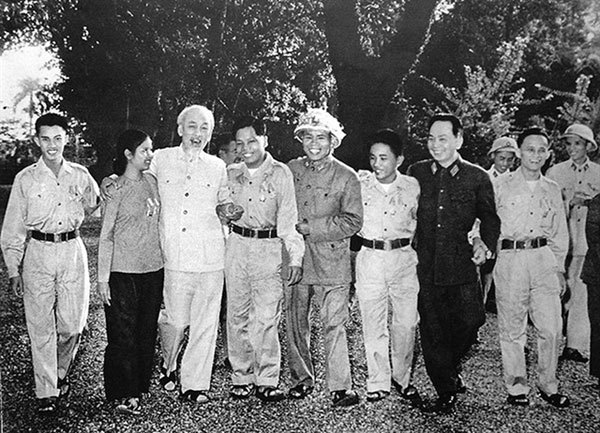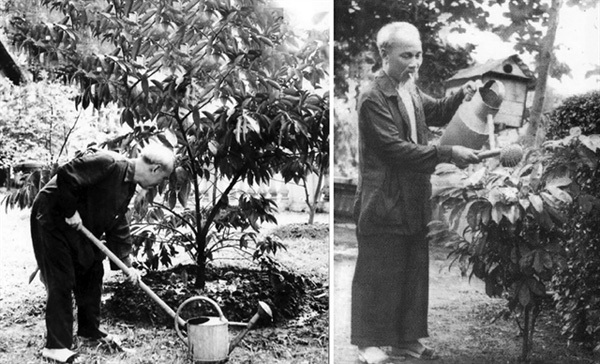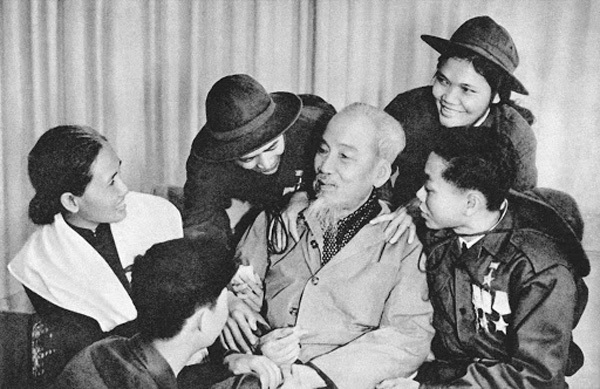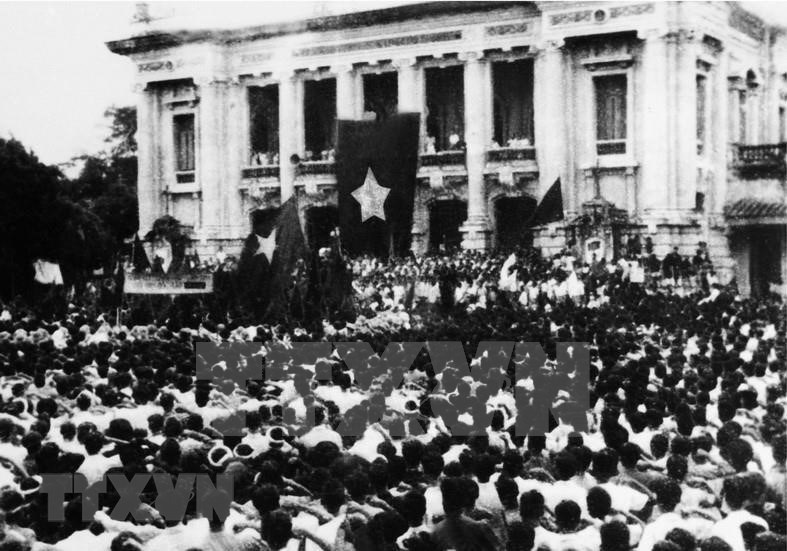 |
| ALL SMILES: President Ho Chi Minh (third from left) and General Vo Nguyen Giap (fourth from right) greet youths coming north from South Vietnam in 1966. VNA/VNS File Photo |
On their return, many southerners found respectful feelings toward the man who fought all his life to free his country from colonisation. Revolutionary poet To Huu wrote in his poem Bác ơi!:
“Bác nhớ miền Nam, nỗi nhớ nhà
Miền Nam mong Bác, nỗi mong cha”
"He misses the South as if missing home
"The South misses him as if he were the founding father
The South is blood and flesh of Vietnam
Born in the central province of Nghe An, the young Nguyen Sinh Cung, as he was known in his childhood, spent his coming of age years in the then Hue royal capital city.
In 1911, from Nha Rong Wharf of Sai Gon, now Ho Chi Minh City, the young ambitious Nguyen Tat Thanh (another alias) boarded a French sea liner with a burning desire: "Freedom for my fellow countrymen, independence for my Motherland, is all that I wanted. That's all that I understood."
From that moment until he died, only a year short of 60, Ho Chi Minh was never able to set foot in the South again, which gave him unceasing anguish. He had great compassion for the people and soldiers.
He closely followed the long arduous fight of the people in the south. After the August Revolution in 1945 and the nine-year resistance war to fight the French reoccupation of the country, especially after the southern resistance started in September 1945, President Ho lived the life of the southern people, sharing their pain and losses.
He confided to close aides: "In the South, each person, each family has its own anguish. All of the people's anguishes and pains combine to make my own sorrow."
He tossed and turned, saying: "Each day, when our Motherland is not reunited, our people still suffered, that day I don't sleep nor eat well," according to Hồ Chí Minh's Complete Works.
On June 1, 1946, before he left for France to find a peaceful solution to Vietnam's independence, President Ho Chi Minh wrote an open letter addressing the people of the South that reiterated: "The people of the South are the people of Vietnam!"
At the Franco-Vietnamese Conference in Fontainebleau, a town southeast of Paris, France, he declared: "The South is the blood of the Vietnamese blood. It is the flesh of Vietnamese flesh. Rivers can run dry, Mountains can be eroded, but this Truth shall never be changed!"
When he came back from France without a peaceful solution, he said: "With our fellow countrymen's determination, our own people's determination, the South shall return in the loving embrace of our common Motherland."
When the nine-year-long resistance war ended in the victorious Dien Bien Phu battle, the country was once again divided in two according to the Geneva Agreement.
President Ho wrote a letter in September 1954 to the soldiers and their families, who left the South to be regrouped in the North: "Until the day peace shall be restored in our country, reunification be implemented, independence and democracy completed, you, my dear fellow countrymen shall be joyful to return to your homeland. Then I would be delighted to join you in a visit to our beloved southern land."
'The South is always in my heart'
 |
| GREEN THUMBED: President Ho Chi Minh waters a star apple tree, a gift from the south, at the Presidential Palace. VNA/VNS Archives |
During the later years of his life, from 1955 until he died in 1969, President Ho Chi Minh closely followed each movement of the southern revolutionaries.
In 1962, he happily hosted representatives of the National Liberation Front, who walked jungles and dirt roads to come north.
The meeting was simple and emotional and people still remember him touching his left chest saying: "I have nothing to give to you, all I have is this. The dearest South is always in my heart!'"
In 1963, upon hearing he was about to be bestowed with the most honourable accolade of the Democratic Republic of Vietnam, he thanked the National Assembly and said: "When the people of the North are working their best to build socialism and support the people of the South, the people of the South have been bravely fighting to protect the gradual peaceful rebuild in the North. That's why the people of the North miss the South each and every minute passing by.
"For the long-lasting 20-years, the people of the South went on fighting against the French colonialists and then the American-Sai Gon regime, the people of the South gravely deserve to be the stronghold for the country acknowledged by this noble order.
"For the above-mentioned reasons, I hereby propose to the National Assembly as follows: Let's wait until the day when all the South is completely liberated, our country reunified, the North and South come under one roof, the National Assembly shall let people of the South award me this order. Only then, shall all our people rejoice."
 |
| Liberation fighters from the South meet President Ho Chi Minh. VNA/VNS File Photo |
In 1964, when President Ho met a group of young people from the South, he said: "I longed for you as I missed the people of the South very much!"
He spoke with each one, and they said the deepest fear of some soldiers and cadres working in the South was not hardship or death but never getting a chance to meet President Ho.
In August 1969, during his last days, President Ho still listened to military briefings about the southern fronts. Each time, when he woke up, the first thing he asked was about news from the South.
Before he passed away, in his will, he spared his deepest and warmest feelings for the people of the South, for the liberation of the South.
He wrote: "The fight against the Americans to safeguard our country by our people may be longer with more hardship and sacrifices, but it will end in complete victory. It's for sure! I have a wish that on that day, I will travel to all corners of the North and South, to congratulate our people, the heroic cadres and soldiers, visiting our elderly, the youths and the children of our country."
In response to President Ho's love, the people of the South, with support from the North, have fought bravely to reunify the country in 1975.
His utmost wish, "When the North and South shall come under one roof, the people become rich, the country becomes strong, then I shall be delighted.”
On April 30, 1975, the people of Vietnam sang this song, "As if President Ho were here on this joyful V-day."
The song still resonates until today with its chorus: "Vietnam - Ho Chi Minh, Vietnam - Ho Chi Minh." VNS
Minh Hieu

Southern region thrives after 45 years of reunification
After 45 years of national reunification and three decades of the Doi Moi (renewal) process, under the leadership of the Party, southern provinces and cities’ economy have thrived dramatically.

Vietnam makes breakthroughs under Communist Party's leadership
15 years after founding the Communist Party on February 3, 1930, Vietnam, under the Party's leadership, made breakthrough in the long war against the French with the successful August Revolution.
 During his lifetime, President Ho Chi Minh held a special affection for the people of the South of Vietnam. He said on numerous occasions that: "Our endearing land of the South has always been in my heart."
During his lifetime, President Ho Chi Minh held a special affection for the people of the South of Vietnam. He said on numerous occasions that: "Our endearing land of the South has always been in my heart."